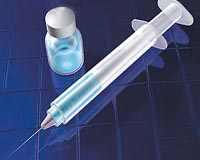| . |  |
. |
Paris (AFP) Aug 18, 2009 Northern hemisphere countries have so far ordered more than one billion doses of swine flu vaccine, the World Health Organisation said Tuesday, sparking warnings over shortages. Some countries -- notably Greece, The Netherlands, Canada and Israel -- have ordered enough double doses to inoculate their entire populations. Others, such as Germany, the United States, Britain and France, have put in orders that would cover between 30 and 78 percent of people. "Pandemic vaccine orders put in by northern hemisphere countries stand at over one billion," WHO spokeswoman Melinda Henry told AFP. "In the early days, there will be a very limited supply of vaccine. There won't be sufficient supply to vaccinate whole populations, or even huge proportions of populations," Henry said by phone. Intense demand coupled with production delays could create shortages, forcing governments that are preparing for a second, possibly more deadly, wave of flu to make hard choices about who to vaccinate first, experts have warned. In July, the WHO said that the 25 drug companies which had announced their intention to manufacture vaccines could crank out up to 94 million doses per week starting in mid-October. The global health body revised these numbers sharply downward when the top half-dozen vaccine makers -- accounting for 85 percent of global production -- reported that the swine flu strains with which they were working did not reproduce as quickly as expected. "The current vaccine strain would only yield 25 to 50 percent" of the original estimate, as low as 23 million doses per week, said Henry. Clinical tests have not yet confirmed whether new strains under development will produce higher yields, and initial results for at least one, reviewed by WHO Tuesday, are not encouraging. There remains a big question mark, Henry said, as to whether one or two doses will be needed for effective vaccination. A Chinese drug company, Sinovac Biotech, announced Tuesday that it had completed clinical trials showing that its new vaccine "induces good immunogenicity after one dose." But many experts have said that double doses will be needed because most people have no immunity to the so-called "novel" A(H1N1) virus. A shortfall in supply would essentially oblige national health authorities to ration the vaccine. US health officials said Tuesday they expected a large shortfall in swine flu vaccines, with only 45 million doses due to be ready in time for the start of a vaccination programme in mid-October. Last month officials there said 120 million doses would be available to vaccinate those considered most at risk. "Policy makers are still coming to terms with who the target groups should be," said Mark Miller, an epidemiologist at the Fogarty International Centre of the US National Institutes of Health. Virtually all international and national health authorities say health sector professionals should be vaccinated first, because they are frequently exposed to the virus but above all to insure that health facilities can operate at maximum efficiency during peak periods of infection. Beyond that, there are no universal guidelines. "Individual countries have to look at their own conditions and adapt. They have to decide whether they want to stop transmission, protect essential infrastructure, or reduce illness and death," Henry said. Each of these priorities imply different strategies, and entail protecting different sectors of society. Some experts recommend vaccinating all school-age children and their parents to stop the flu from spreading, while others say vulnerable populations must be first in line. But even knowing who is vulnerable is a problem, experts say. Historically, during seasonal flu epidemics, priority has gone to the elderly and those with chronic diseases, such as asthma or other lung conditions. "But we know from our research that it is actually younger populations which are more affected during pandemics -- it is one of the signature features of pandemics," Miller told AFP. In a study published last August, Miller showed that each of the 20th century's major pandemics would have required a different vaccination strategy in order to save the maximum number of "years of life lost." Share This Article With Planet Earth
Related Links Epidemics on Earth - Bird Flu, HIV/AIDS, Ebola
 Shortfall expected in US swine flu vaccines
Shortfall expected in US swine flu vaccinesWashington (AFP) Aug 18, 2009 US health officials said Tuesday they expect a large shortfall in swine flu vaccines, with only 45 million doses due to be ready in time for the start of a vaccination program mid-October. Last month officials said 120 million doses would be available to vaccinate those considered most at risk from the A(H1N1) influenza virus, which has claimed nearly 500 lives in the United States. "Our ... read more |
|
| The content herein, unless otherwise known to be public domain, are Copyright 1995-2009 - SpaceDaily. AFP and UPI Wire Stories are copyright Agence France-Presse and United Press International. ESA Portal Reports are copyright European Space Agency. All NASA sourced material is public domain. Additional copyrights may apply in whole or part to other bona fide parties. Advertising does not imply endorsement,agreement or approval of any opinions, statements or information provided by SpaceDaily on any Web page published or hosted by SpaceDaily. Privacy Statement |